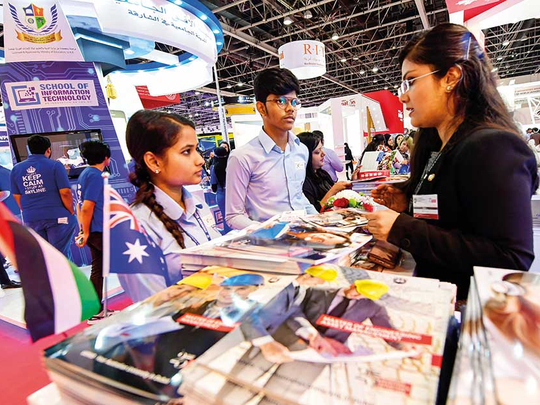
Dubai: More than 18 months after a new law allowed university students to take up part-time jobs in nine free-zone clusters, the scheme has found few takers mainly due to lack of awareness among employers, universities said on Thursday.
In interviews on the sidelines of the 30th Gulf Education and Training Exhibition (Getex) at Dubai World Trade Centre, they said there was confusion among employers about being able to legally hire students in part-time jobs and they were also unclear about benefits of hiring them.
Dr Vajahat Hussain, chief executive officer Amity University Dubai said while they have introduced a 20-hour programme “Work as you Learn” and some students have been hired by retail and IT companies, he believes there should have been more progress. “The challenge is more of the awareness on the part of the companies because we as a university are aware and the students are too, but more companies need to know they can hire students as part time employees legally,” he said.
He said companies also lack patience in taking students without experience or skills and prefer to outsource jobs. “However, we believe in the next couple of years, it will pick up and companies will see the benefits of getting students on part-time jobs.”
According to him, the part-time job rule has worked mainly as a magnet in attracting international students to the country.
‘Confusion’
Employers are not clear about the exact arrangements with regard to part time jobs, according to Niranjan Jayakumar, vice-president and business head, Manipal University.
“We have been sending students who are interested in taking up part-time jobs, but what we have seen is that there is some confusion that students cannot be employed when on student visa and employers then ask us for NOC for employment which we cannot give. Those kind of policy-related questions are there and since the guidelines are new, more visibility need to be brought in the guidelines and rules,” he explained.
Also, work-study balance on the part of students is another challenge that could be putting off employers. Students pursuing full-time courses have classes during day and a few jobs are available in the evening.
“Because of the options on part-time jobs we have seen a growth of 50 per cent in international students coming to study with us and the interest to earn while they learn comes from them. For some students it’s the question of balancing academic knowledge, while employers expect students to be doing the activity full-time,” said Jayakumar.
Dr Cedwyn Fernandes, Director at Middlesex University, said while the rule is good to have, one of the reasons it has not picked up is because the type of part-time jobs students seek are not really available at companies.
“It’s still in its early days, I think. Undergraduate students at our university have not been interested because of time constraints, but the issue is not always with the students but more with employers because they are not sure if the students are available as they want them to be available whenever they want,” he said.
Profeffor Ammar Kaka Vice Principal, Heriot Watt University said the university has attracted 100 Chinese students since the rule was announced.
“We have students going for part-time jobs since the rule was announced, but I see the challenge in terms of restricting the opportunities for students to work only in freezones. There are companies interested in being part of the education system of the new generation, but it’s not happening to a big extent,” he said.
Getex kicks off
Getex was officially opened on Thursday at the Shaikh Saeed Halls at Dubai International Convention Centre. This year’s show will feature more than 250 leading universities and training institutes from across the world who will present their undergraduate and postgraduate academic and occupational courses to over 35,000 students in exploring potential learning opportunities.
The exhibition ends Saturday.
Earn while you learn
New regulation announced by Dubai Creative Clusters Authority (DCCA) in 2016 grants part-time work permits to around 25,000 students mostly enrolled at around two dozen academic institutions licensed by DCCA, primarily located in Dubai International Academic City (DIAC) and Dubai Knowledge Park. This is in addition to government universities.
The new regulation is being implemented with the support of the Knowledge and Human Development Authority (KHDA).
It enables 4,500 businesses in the emirate’s nine creative clusters.
Students must be in good academic standing and, generally, in their second year of university.
A central clearing system, like an online marketplace, will connect employers with student workers, after checks on eligibility.
Students right to pay will be guaranteed. Work hours will be limited to prevent impact on studies.








